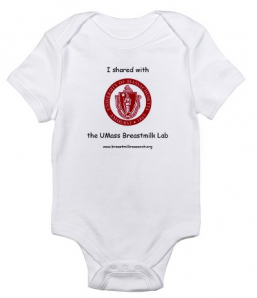 You know that your milk can do amazing things for your baby, but did you know that it may also hold the keys to our understanding of breast cancer risk?
You know that your milk can do amazing things for your baby, but did you know that it may also hold the keys to our understanding of breast cancer risk?
Dr. Kathleen Arcaro is an environmental toxicologist at the University of Massachusetts, Amherst. Her current research uses analysis of cells in breastmilk to study breast cancer.
Why does she collect breastmilk? Because it contains breast cells from our milk ducts, and these cells contain DNA which is immensely valuable.
It’s not easy to get these cells. You either have to pierce or cut open a breast through biopsy, put someone under general anesthesia and stick something up through the nipple to collect cells from the ducts, or squeeze out what’s called nipple aspirate fluid. Any takers?
It turns out, though, that if a woman is lactating, these cells are quite easy to get. Thousands of breast epithelial cells from our milk ducts naturally slough off into each milliliter our milk. And even more importantly, they come from all over the breast. Compared that to a biopsy, which can only get cells from one spot, our milk is a gold mine. And all women have to do to produce it is pump, once.
So what can you do with breast cell DNA from breastmilk? You can look at the health of some important cancer preventing and fighting genes. We have genes that suppress the growth of tumors, but they won’t work if methyl groups attach to them. How do the methyl groups get there? Our lifestyle - everything we do, from smoking to diet to exercise and environmental exposure - can compromise these vitally important functions. We’re learning which kinds of methylation are warning signs of breast cancer risk, through research like this.
Understanding how methylation is related to breast cancer is important for two reasons: One is the hope that one day women might be able to get a personalized breast cancer risk profile simply by sending in a milk sample to a lab. The second is that once the “target” methylation is revealed by this research, new treatments may actually be able to reverse it. Amazingly, some of the first generation chemotherapy drugs are in fact “anti-methylating” agents – drugs which can remove methyl groups from your DNA, allowing it to function properly in the fight against cancer.
So, how can you help this research effort? Glad you asked! Right now Dr. Arcaro is looking for moms to participate in several studies. These change all the time, so if you don’t qualify now don’t despair! Check the lab’s website and friend the UMass Breastmilk Lab’s Facebook page to see if you qualify for future studies.
As of this writing Dr. Arcaro is looking for:
- African American women living anywhere in the country who are willing to send in a fresh milk sample (at the lab’s expense). Why African American women? See this post.
- Women who have or have had breast cancer who are willing to send in either frozen milk (in the case of women who have stopped nursing but have some milk stored) or fresh milk (women who are still producing milk).
- Women who have had, or who are expecting to have, a breast biopsy, who are willing to send in a fresh sample of milk.
- Dr. Arcaro is also urging all African American women (nursing or not) to register with the Love/Avon Army of Women (and remember to mark “breast milk study” when asked how you heard about the Army of Women!). The Army of Women assists researchers in finding participants for important studies like Dr. Arcaro’s.
If you think you may qualify to participate in one of these studies, please contact Beth by email or phone: (413) 545-0813. And please spread the word to friends and family. Dr. Arcaro and her team thank you for your interest and support!














